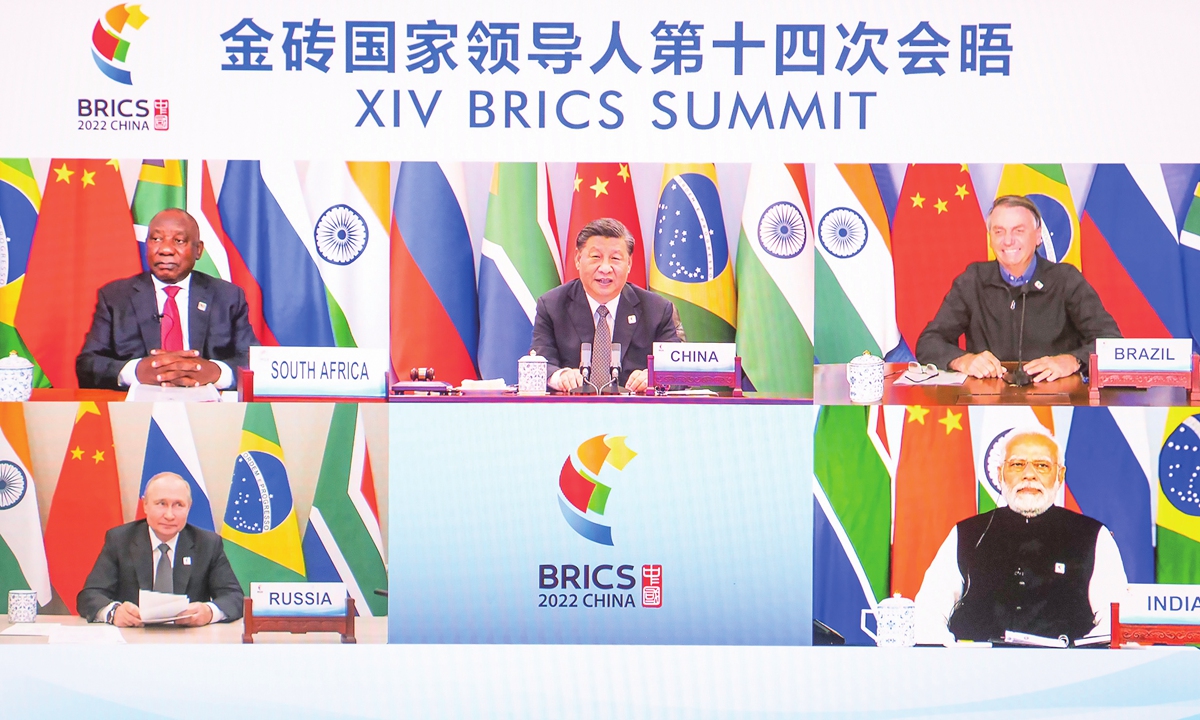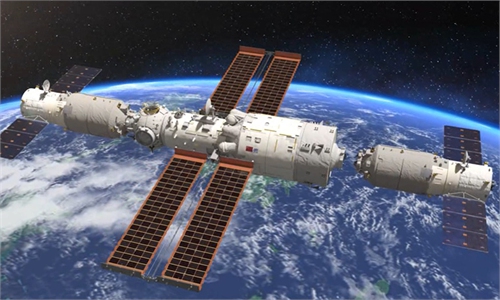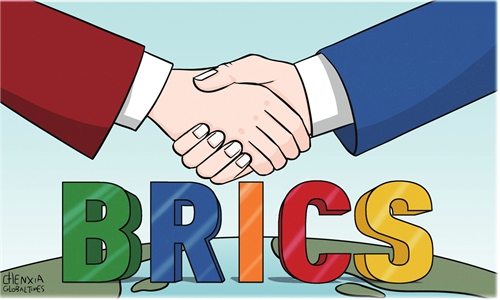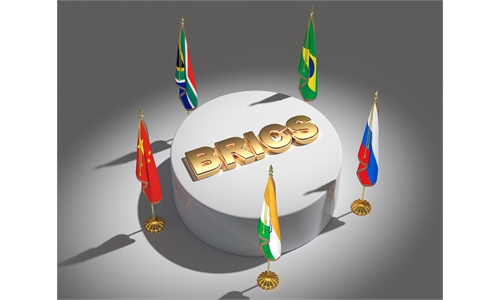
Chinese President Xi Jinping hosts the 14th BRICS Summit in Beijing via video link on June 23, 2022. Photo: Xinhua
In a virtual speech delivered at the 14th BRICS Summit in Beijing, Chinese President Xi Jinping on Thursday lauded the BRICS mechanism as having shown resilience and vitality in the current global crisis, and called on the mechanism to stay open and inclusive to welcome like-minded partners to join the big BRICS family, while firmly opposing the abuse of unilateral sanctions and rejecting "small circles" built around hegemony.
Chinese analysts said the summit sent a strong signal to the world that apart from Western-dominated organizations, which have harmed the world economy with bloc-to-bloc confrontation and abuse of sanctions, there are multilateral mechanisms formed by non-Western major economies, just like BRICS, that can effectively represent the majority of the international community in making joint efforts to realize recovery and overcome global challenges.
Xi noted that over the past year, the world has faced the continued spread of COVID-19, a tortuous world economic recovery and increasingly salient peace and security issues. Facing these formidable and complex circumstances, BRICS countries have embraced the BRICS spirit of openness, inclusiveness and win-win cooperation, enhanced solidarity and coordination and jointly tackled the challenges. The BRICS mechanism has demonstrated resilience and vitality. BRICS cooperation has achieved sound progress and results.
Xi stressed that this Summit is being held at a critical juncture in the shaping of the future course of humanity. BRICS countries, as important emerging markets and major developing countries, need to act with a sense of responsibility to bring positive, stabilizing and constructive strength to the world.
Chinese analysts said that BRICS is not just an organization formed by newly emerging economies, but is now playing a key role in the international order. Currently, BRICS countries represent 40 percent of the world population, account for 25 percent of the global economy and 18 percent of world trade, and contribute 50 percent to the world's economic growth.
Wang Lei, director of the Center for BRICS Cooperation Studies at Beijing Normal University, told the Global Times that this is a clear trend of change in the global power balance, showing that power is no longer monopolized by the US, and the West needs to get used to this trend and embrace it, rather than contain it.
Trade connectivity among BRICS countries is becoming closer and tighter, especially under the shadow of the COVID-19 pandemic. According to Chinese government data, in the first five months of 2022, China's total imports and exports with other BRICS countries increased 12.1 percent year-on-year, with a 20 percent increase with Russia and 10 percent increase with India.
Later this month, two US-led multilateral mechanisms - G7 and NATO - are also going to hold summits. These US-led blocs formed by Western countries are going to continue to intensify tensions, confrontations and decoupling with US competitors like China and Russia, and this could further harm not only global recovery but also the peace and security of the world, so BRICS needs to stay united and jointly handle the shared concerns and challenges, experts said.
After the summit, leaders of the five countries adopted the BRICS 2022 Beijing Declaration, covering fields including "Strengthening and Reforming Global Governance," "Working in Solidarity to Combat COVID-19," "Safeguarding Peace and Security," "Promoting Economic Recovery," "Expediting Implementation of the 2030 Agenda for Sustainable Development," and "Deepening People-to-People Exchanges" and "Institutional Development."
Oppose sanctions, hegemony
Xi said "we need to speak out for equity and justice. We need to encourage the international community to practice true multilateralism and uphold the international system with the UN at its core and the international order underpinned by international law, and urge the world to reject the Cold War mentality and bloc confrontation, oppose unilateral sanctions and abuse of sanctions, and reject the small circles built around hegemony by forming one big family belonging to a community with a shared future for humanity."
In the speech held under the theme "Fostering High-quality Partnership and Ushering in a New Era of Global Development" with other BRICS leaders, Xi said "some countries are now seeking absolute security via expansion of military alliances to force other countries to take sides and create bloc confrontation, to overlook other countries' interests and rights and seek supremacy. If we let this dangerous trend continue to develop, the world will become more turbulent and insecure."
A Beijing-based senior expert on international relations who asked for anonymity said that anyone familiar with international politics would easily see who are those "some countries" criticized by the Chinese president.
"Who instigated the Russia-Ukraine crisis by pushing NATO's expansion eastward? Who forced other countries to sanction Russia and ban energy imports to damage the world economy? Who used rumors and disinformation to push illegal sanctions against Chinese products made in Xinjiang? Who is trying to form a new bloc-to-bloc confrontation in the Asia-Pacific region to copy the disaster of the Ukraine crisis to contain China's development? The answer is crystal clear - the US," he said.
Wang Yiwei, director of the Institute of International Affairs at the Renmin University of China, told the Global Times that "based on the experience of history, when a group of major powers tries to isolate one major power without respecting its rightful interests and security concerns, to humiliate it with sanctions and compensation, in other words, 'to push a major power into a corner,' it will bring a world war."
Therefore, BRICS countries are making efforts to find a new type of international relations, to be inclusive and collective, to build a community with a shared future for humanity, and only by doing so can we avoid the crisis between the West and non-Western powers that goes round and round in the Western-dominated order, Wang Yiwei noted.
Emerging non-Western powers
At the summit, Russian President Vladimir Putin said, "The countries that form this group have been seeking to step up their cooperation on all global and regional matters. The BRICS format has been consistently increasing its prestige and international influence. This is an objective process, since the five BRICS countries, as we all know, have immense political, economic, scientific, technical and human potential."
"We have everything we need to work together and achieve results for ensuring global stability and security, sustained growth and prosperity, and better well-being for our people," Putin said.
Western media reported the BRICS Summit from a special angle, such as saying an "isolated" Russia has made an appearance at a multilateral event with other major economies for the first time since it launched its military operation in Ukraine.
According to the Beijing Declaration, the BRICS leaders said, "We have discussed the situation in Ukraine and recall our national positions as expressed at the appropriate fora, namely the UNSC and UNGA. We support talks between Russia and Ukraine."
Feng Xingke, secretary general of the World Financial Forum and director of the Center for BRICS and Global Governance, told the Global Times that the BRICS countries hold a very similar stance on the Russia-Ukraine crisis, even though they share no common ideology and have no alliance treaty like NATO, and they didn't carry out any specific coordination before announcing their stances, which "proves that BRICS really represents the stance of developing countries and emerging markets."
Developing countries focus more on development and people's livelihood, so they have no interest in instigating conflict and intensifying existing crises through weapon supplies and sanctions, just as those Western countries have done, Feng said.
After the Russia-Ukraine crisis began, the US-led Western abuse of sanctions against Russia totally ruined and interrupted the global economic order, and is bringing global inflation and price rises in many products, which harmed everyone including the US itself, said experts.
"Middle Eastern and African countries like Egypt are facing a serious food crisis, and the inflation rate in Turkey and Argentina has reached 50 percent. These are all serious problems that should not be ignored by the international community," Feng said.
The Ukraine crisis just marginalized many problems in developing countries, as Western mainstream media is paying attention to the crisis in Ukraine, and this also makes the international community give less attention and assistance to developing countries in regions like Africa and the Middle East, analysts said.
This means BRICS is an organization formed by major economies that will pay attention to these problems, as there are many developing countries that have been included in the BRICS Plus platform, and trying to bring about global recovery without solving problems in developing countries will not succeed, experts noted.




